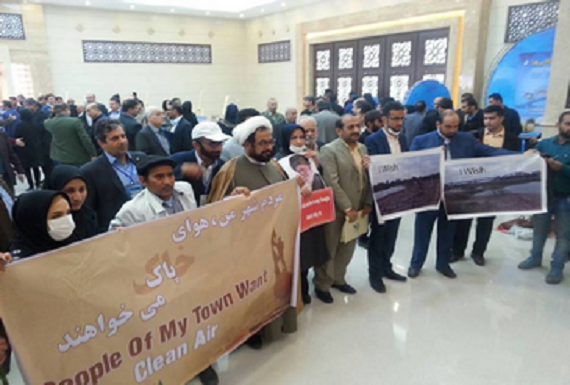AHWAZIS DEMAND INT’L PROTECTION FOR WETLANDS THREATENED BY EXTINCTION

Araz News: At the World Wetlands Day celebration in AL- Ahwaz, Ahwazi people demanded international protection for their wetlands which are at risk of extinction.
On World Wetlands Day, which is celebrated on the 2nd of February each year, the city of Ahwaz witnessed the arrival of a UN delegate, Gary Lewis, and Masoumeh Ebtekar, Vice President of Iran and head of the Environmental Protection Organization, for a meeting to discuss the AL -Ahwaz wetlands and their maintenance.
This event was seen as an important opportunity for Ahwazi civil activists to raise awareness and to highlight catastrophic disasters which have occurred in the region, due to either the deliberate action, or negligence, of the Iranian regime.
However, the Iranian regime did not allow the Ahwazi environmental activists to attend the meeting, fearing the consequences for themselves if the Ahwazis were able to take full advantage of this great opportunity to speak. But, a voice of Ahwaz did break through the barriers.Mr. Nasseri Nejad, MP for Falahiyeh, courageously spoke up about the wetlands situation and, to great applause from the audience, challenged Mrs.Ebtekar’s assertion that 70% of the wetlands water had returned to the wetlands.
Mr. Nasseri went on to denounce the government’s deliberate policy of destroying the Al-Ahwaz environment and providing misinformation about the situation. He stated that the reality was that, the environment was growing worse every day due to the drying of the lakes and wetlands as a result of the operations undertaken by the oil exploration and extraction companies.
Outside the room, there were a number of Ahwazi activists, men and women, who, while unable to be actually in the meeting due to the imposed restrictions, had set up a protest outside the hall against the presence of Mrs. Ebtekar, as she is forever blaming neighboring countries for being the source of the dust and storms that plague Al-Ahwaz.They were holding placards with slogans such as: “lakes and wetland drought are because of you (the regime) and we want international protection for them” and “Ebtekar is trying to falsify the facts about the true cause of drying up wetlands in Al-Ahwaz”.
One of the most serious risks threatening Ahwaz’s environment is the slow demise of its rivers. Particularly, the Karoon, Karkheh,Jarrahi and Dez, whose drying up has led to drought and desertification of lands. Such drought is having a devastating impact on Ahwaz’s vast marshlands such as the Hor- Howeyzeh, Hor -Falahiyeh and Hor Ilmenau.These marshlands are known worldwide for their natural resources and as sanctuaries for migratory birds like ducks, geese, cranes, herons, storks, starlings, and falcons.
The Ahwazi areas are temperate in climate, once rich in wetlands, ponds, and numerous lakes and for centuries have been a suitable habitat for aquatic and wading birds coming from cold countries including Russia and Tajikistan every year during their migration.
In recent years, Oil exploration at the heart of the wetlands has caused drastic pollution and destruction of the aquatic ecosystem of the wetlands. As a result, large numbers of fish and other rare and endangered species of birds that have always inhabited these regions, are believed to have died of diseases caused by polluted emissions and oil spills.
It is worth noting that the water supply has become a critical problem in the region, especially since the regime has decided to go ahead with its disastrous diversion of the river Karoon, as well as building numerous useless dams across the region. The rivers are the source of common wealth of the Ahwazi Arab people because of their potential for fishery and suitable environment for livestock. Moreover, they have a stabilizing impact on the environment of Ahwaz’. The drying of these rivers by the Iranian regime is, plain and simple, a declaration of war on Ahwaz’s farmers whose lands stretch from the Zagros Mountains all the way to the marshes and the Arabian Gulf.
Undoubtedly, this dryness will have drastic repercussions on the lives and fate of the Ahwazi farmers who will most likely will be forced to abandon their lands in search of other destinations and alternatives which will allow them to survive. It might also, perhaps, compel them to migrate to the Persian cities, which seems to be the regime occupier’s goal – to humiliate the Ahwazis and make them beg for their livelihoods from their antagonists. All the while leaving the land free for Persian settlers backed by the occupying regime.
As a result of building dams on the rivers, the Ahwazi farmers are forced to use the contaminated water containing sewage and harmful industrial discharges to irrigate their lands where they cultivate wheat and barley. This, of course, has serious ramifications on the health of the Ahwazis because of the toxicity and lack of nutrients in their agricultural product.
The scarcity of potable water for agricultural purposes has already driven Ahwazi farmers in the rural areas to use wastewater to irrigate their farmland. Informed sources have claimed that nearly 2,500 hectares of arable and fertile lands in Gheizaniyeh oil- rich area, which lies east of the city of Ahwaz, are being irrigated by sewerage and industrial water.
It is not surprising then, that the dryness of Ahwazi Rivers and wetlands is the major cause of severe environmental pollution and devastating sandstorms as well as the spread of epidemics and various diseases. The amount of dust particles in Ahwaz’s air was measured to be over 10 thousand micrograms per cubic meter. This amount is about 70 times more than the standard rate which is 150 micrograms per cubic meter.
These adverse weather conditions are known to have triggered drastic asthmatic attacks and other related allergic reactions among Ahwazi people, as hundreds of citizens were admitted to medical centers after suffering from severe respiratory disorders due to the thick dust storm and air pollution. This situation must not be allowed to continue.
By-ahwazmonitor


























